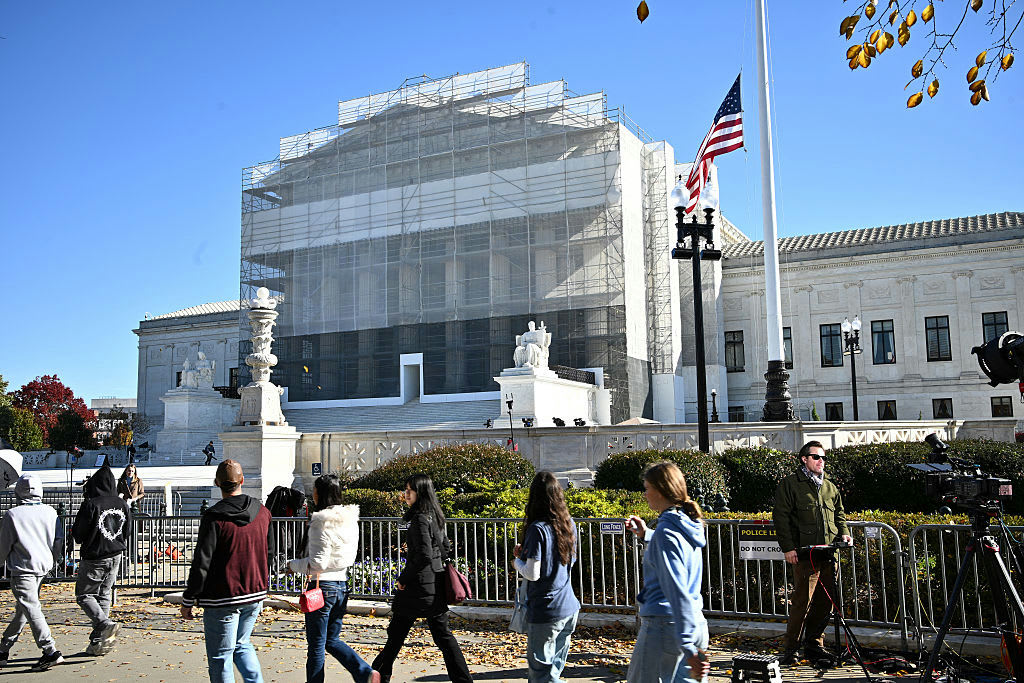Supreme Court cancels arguments in Title 42 case with border policy set to end in May
Washington — The Supreme Court on Thursday canceled arguments it had scheduled over a pandemic-era policy known as Title 42 that allows U.S. border officials to swiftly expel migrants, after the Biden administration said the case would be rendered moot once the border restrictions expire in early May.
The high court had been scheduled to hear oral arguments on March 1 in a case over whether a group of Republican-led states should be allowed to defend the legality of Title 42, which the Biden administration has sought to end on the premise that it is no longer needed to contain the coronavirus.
The Biden administration told the Supreme Court in a filing earlier this month that the Republican-led states' request would be moot on May 11, when the expiration of the national COVID-19 public health emergency is set to trigger Title 42's demise. On Thursday, the high court removed the case from its calendar.
Since it was invoked by the Trump administration at the outset of the pandemic in March 2020, the public health law underpinning Title 42 has allowed U.S. officials along the Mexican border to expel migrants over 2.6 million times to Mexico or their home country, without allowing them to request asylum, federal data show.
While the Trump administration said Title 42 was designed to prevent the spread of the coronavirus, Centers for Disease Control and Prevention (CDC) officials have said the agency came under pressure to approve the expulsions, despite concerns about a shoddy public health rationale.
The Biden administration defended Title 42 and its stated public health justification for over a year. But it moved to end the policy in the spring of 2022, citing improving pandemic conditions and increased vaccination rates in migrants' native countries. That effort was halted after Republican state officials convinced a federal judge in Louisiana to rule that Title 42 had been improperly terminated.
In November 2022, a federal judge overseeing a separate lawsuit declared Title 42 illegal, saying the government had not sufficiently considered the measure's impact on asylum-seekers.
Because of that order, Title 42 was set to end in late December. But at the request of the same group of Republican-led states, the Supreme Court suspended the lower court ruling, allowing border officials to continue the expulsions.
While it has tried to end it, the Biden administration has employed Title 42 as one of its main migration management tools amid record levels of migrant apprehensions along the southern border over the past two years. In fact, since January, the administration has been able to significantly reduce unlawful border crossings through a new strategy that partially relies on Title 42.
In early January, President Biden announced that migrants from Cuba, Haiti, Nicaragua and Venezuela would be expelled to Mexico under Title 42 if they attempted to cross the southern border illegally. Mexico, for its part, committed to accept the return of up to 30,000 migrants from these countries on a monthly basis.
At the same time, the Biden administration announced it would allow up to 30,000 Cubans, Haitians, Nicaraguans and Venezuelans to fly to the U.S. legally each month if Americans or others in the U.S. sponsored their arrival. It also unveiled a mobile app that allows migrants in Mexico to request an appointment at a port of entry, so they can request an exemption to Title 42 on humanitarian grounds.
Republican lawmakers have said the Biden administration is not ready to end Title 42, and their concerns have been echoed by some centrist Democrats. Earlier in February, some Senate Democrats joined Republicans in introducing a bill that would extend Title 42 for at least two months after the emergency declaration expires.
Biden administration officials have said they've been preparing for Title 42's end for the past year, including by expanding a process known as expedited removal that allows U.S. border officials to rapidly deport migrants who don't ask for asylum or who fail to establish credible fear of persecution.
The administration is also planning to publish a regulation before May 11 that would disqualify migrants from asylum if they do not ask for refuge in third countries on their way to the U.S. Those subject to the policy, which has garnered criticism from progressives, could be deported from the U.S. without a court hearing.
The case in which the Supreme Court canceled arguments Thursday is one of several lawsuits Texas and other Republican-led states have filed against Mr. Biden's immigration actions.
Twenty states led by Texas on Wednesday asked a federal judge to immediately halt the sponsorship process that allows up to 30,000 migrants from Cuba, Haiti, Nicaragua and Venezuela to enter the U.S. legally each month, saying the authority underpinning the program can't be used to admit large numbers of foreigners.
The Biden administration has warned that the collapse of the sponsorship program could lead Mexico to reject U.S. expulsions of non-Mexican migrants, since officials in Mexico City made the commitment contingent on the U.S. taking in migrants too.




